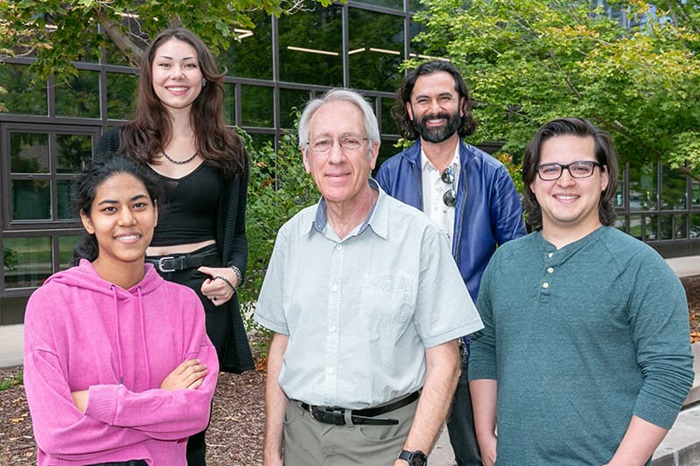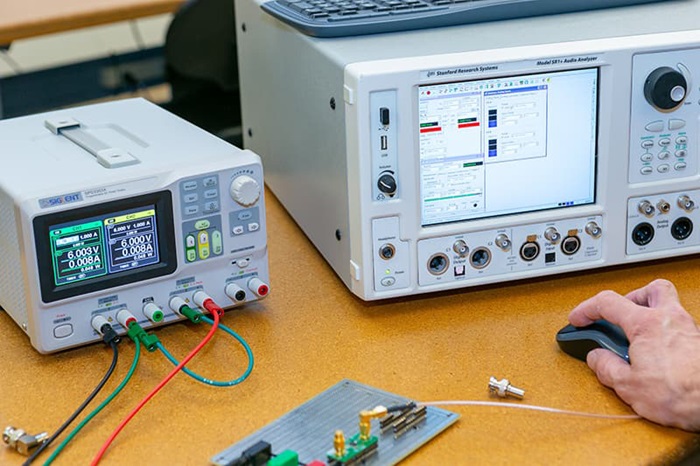Quantum Information Technology Certificate Program Opens New Doors for Students
Nov 13, 2023-crop-2000-sqsh.jpg?sfvrsn=d6c410bb_2)
The future may present many questions, and CU Denver’s new Quantum Information Technology Certificate Program program holds the promise for many new answers—answers that could reduce the environmental impact of batteries, make food production more efficient, and lower the cost of health care, to name just a few.
Colorado is a worldwide leader in quantum information science and engineering (QISE), an inclusive label encompassing applications such as quantum sensors, quantum communication and networking, quantum materials, and quantum computing. The state’s high concentration of quantum organizations and jobs as well as a recent federal designation as a Regional Technology and Innovation Hub focused on the advancement of the quantum industry present significant opportunity for students with an interest in QISE.
A New Frontier for Computing and Careers
Quantum computing, which uses the principles of quantum mechanics to process information, is different from classical computing. While classical computing uses bits which are either “on” (1) or “off” (0) to process information and solve problems step by step, quantum computing uses qubits which can be both “on” and “off” at the same time in a quantum mechanical state of superposition. This allows them to be in multiple states simultaneously and facilitate work on complex scientific questions. Because a quantum computer employs quantum mechanics, it can solve problems that a classical computer simply cannot.
For example, quantum computing might be used to create more efficient batteries that don’t rely on rare-earth metals. This is particularly significant as the auto industry accelerates the shift toward electric vehicles. Another projection is that quantum computing could impact how we feed the world. Around two percent of humanity’s energy consumption goes into fertilizer production. An error-corrected quantum computer could model the chemical process nature uses to fixate nitrogen and turn it into fertilizer using much less energy. Quantum computing might also be used to invent new medical therapies that could be tested in stimulation, resulting in a cheaper drug discovery process.
Given so much potential for technological innovation, quantum computing and the entire QISE field will open doors to new careers, and CU Denver’s Quantum Information Technology Certificate is helping to ensure that our students are ready for them.
Maximizing Opportunity Through Collaboration
The Quantum Information Technology Certificate is a multidisciplinary collaboration between CU Denver’s electrical engineering and physics departments. The four-course sequence with two lectures and two labs provides students a knowledge base as they become familiar with theory, programming principles, and hardware associated with the rapidly emerging technologies related to QISE. The certification is available to both undergraduate and graduate students.
Students pursuing the Quantum Information Technology Certificate learn about and prepare for the vast potential and career possibilities in the quantum industry, says Martin Huber, PhD, physics professor and director of Master of Integrated Sciences program. “Because students are exposed to quantum computing algorithms and hardware and also get a unique hands-on component in the labs, we are preparing them for the quantum information science and engineering workforce.”
The collaborative nature of CU Denver’s program, which draws on expertise from both the electrical engineering and physics departments, creates even greater opportunity. “QISE draws from physics, electrical and mechanical engineering, computer science, and mathematics,” Huber says. “We are using our faculty’s strengths in all of these areas.”
The idea began with a quantum computing course designed in 2018 by electrical engineering professor Tim Lei, PhD. Lei then joined forces with Huber to create a collaborative, interdisciplinary micro-credential (a three-course sequence) offered through the electrical engineering department. Huber subsequently secured philanthropic support from Google to support a fourth course. “That allowed us to offer a collaborative certificate,” he says.
Michael “Bodhi” Rogers, PhD, professor and chair of the department of physics, adds “One aspect of the collaboration is that both undergrad and grad students can sign up through either physics or electrical engineering. We all play different roles, but we work together and have good, regular communication.”
Mark Golkowski, PhD, professor and chair of the electrical engineering department, agrees. “I think it is a compelling testament to how collaborative CU Denver is. What started out organically from one course has grown to a four-course credential with full collaboration between the two departments. Physics has been a great partner to Engineering.”
Rogers says the value for the students is how all of this translates into the larger quantum picture. “There’s a nice balance between mathematics, computing, and laboratory perspectives. Once students go into the job market, they will have experience for a range of quantum workforce jobs along with quantum computing,” he says. “Predictions say that STEM is to increase by 30 percent across all those fields in the Denver metro area. Denver is a hot spot right now for technology, so positioning our students in that way is critical. We also hope people already in the industry will be attracted to the program and take the courses.”
Student Audrey Whitesell is a senior in the electrical engineering department and is in the third course of the certification program. She was interested in the working in the quantum industry as an electrical engineer, and the courses have shown her new possibilities. “Dr. Huber has been tremendous in guiding us through the course. He not only tells us what we need to know, he makes sure that we learn it. It is incredibly interesting, and I’m excited about it. I’m happy to be entering into this industry not only academically but for my future career.”
A Strategic and Philanthropic Investment from Google
Google’s support proved pivotal in creating the final lab course for the program, allowing for the purchase of highly specialized equipment. At the encouragement of CU Denver alumnus Dr. Erik Lucero ’05, Google invested in the program because it provides practical hands-on experience and targets workforce development by supplying sophisticated quantum information technology hardware in an instructional lab.
Lucero is a lead quantum engineer for Google Santa Barbara, where he designed, built, and operates Google’s Quantum AI campus. The lab’s mission is to build an error corrected quantum computer which could enable humankind to solve problems that would otherwise be impossible.
“I see this particular type of certification that CU Denver offers as necessary as we start to build the workforce and bring the next generation up to speed with quantum computing,” Lucero says. “What is great about this is the approach and the ability to take the foundation of quantum information science from theoretical to a hands-on standpoint in an agnostic way. The CU Denver team covers the types of architectures in operation today and is not biased to only one aspect. By giving it breadth and depth, students can decide what interests them.”
“We want our program to offer students a view into the entire quantum realm and that includes areas of engineering, science, and the ecosystem,” Huber says. “So, we are looking at a broader scope in terms of how students will be trained and how this can be used in a variety of industry applications.”
CU Denver’s Quantum Information Technology Certificate Program is early in the game according to Lucero. “It’s amazing how much out in front this is and how they are leading by example,” he says. “The program includes diversity and inclusiveness by bringing two departments together and also encouraging women. I applaud CU Denver.”

